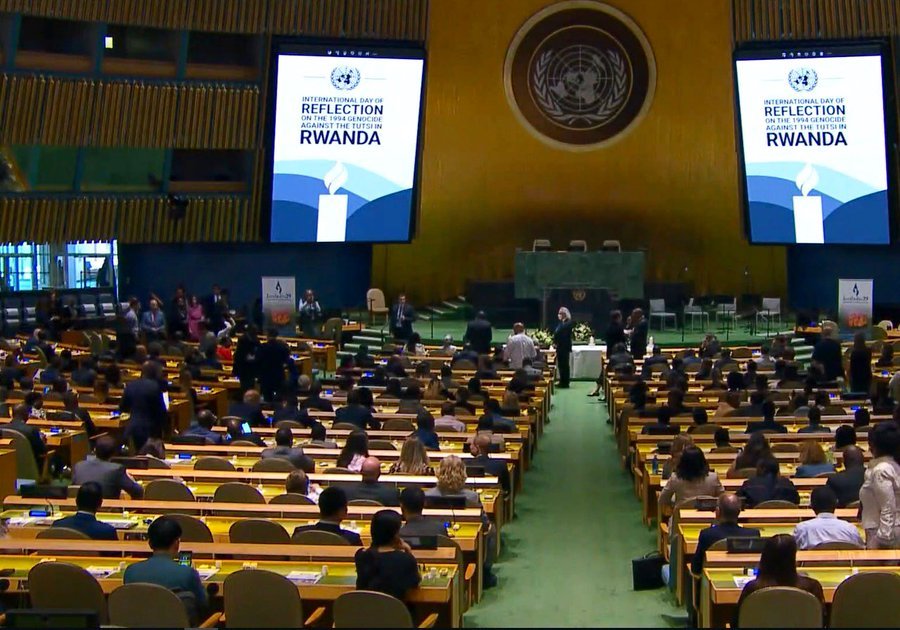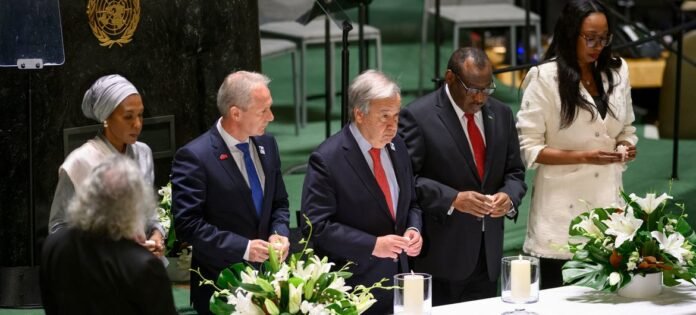NEW YORK, APRIL 14 – On the day commemorating 100 days of horror in Rwanda, Italy at the UN paid tribute to the more than one million children, women and men killed 29 years ago. “Today we remember the Rwanda Genocide as one of the darkest chapters in human history. Let’s all work to prevent genocide and build a world free of hatred”, the Italian Permanent Representative to the UN, Ambassador Maurizio Massari, said on Twitter.
 “Hate speech is an alarm bell – the louder it rings, the greater the threat of genocide”, the UN Secretary General, Antonio Guterres, said on Friday as the General Assembly commemorated the International Day of Reflection on the 1994 Genocide against the Tutsi in Rwanda.
“Hate speech is an alarm bell – the louder it rings, the greater the threat of genocide”, the UN Secretary General, Antonio Guterres, said on Friday as the General Assembly commemorated the International Day of Reflection on the 1994 Genocide against the Tutsi in Rwanda.
“We pay tribute to the resilience of the survivors [and] recognize the journey of the Rwandan people towards healing, restoration, and reconciliation. And we remember – with shame – the failure of the international community. The failure to listen and the failure to act,” said Guterres.
In April 1994, decades-long intercommunal tensions and clashes unfolded before the world’s eyes into genocide, as Hutu leaders led a deadly campaign against the Tutsi. The bloodshed unfolded, despite the presence of the UN Assistance Mission for Rwanda and despite the General Assembly’s unanimous adoption of the Genocide Convention in 1948, which defines genocide as a crime under international law.
“The killings did not start spontaneously,” Mr. Guterres said. “They were carefully planned long in advance and executed deliberately and systematically; it was premeditated murder in broad daylight.”
A generation since the genocide, “we must never forget the dangers posed by the fragility of civility in all societies; it precedes and promotes violence”, he cautioned. The hate and propaganda that paved the path to genocide in Rwanda was broadcast on TV, printed in newspapers, and blasted over radio, he said.
“Today, the megaphones of hate are even bigger,” he said, noting that across the internet, incitement to violence, vicious lies and conspiracies, genocide denial and distortion, and the demonization of “the other”, proliferate with little to no checks.
Calling for stronger guardrails, clearer responsibilities, and greater transparency in the digital world, he said the launch of the UN Strategy and Plan of Action on Hate Speech provides a framework for support to countries to counter this scourge while respecting freedom of expression and opinion.
“Today, I call on all Member States to become parties to the Convention on the Prevention and Punishment of the Crime of Genocide without delay, and I call on all States to back their commitments with action,” the UN chief said.
“Let us stand firm against rising intolerance,” he added. “Let us truly honour the memory of all Rwandans who perished by building a future of dignity, security, justice, and human rights for all.”
General Assembly President Csaba Kőrösi said the genocide was not an accident, but rather, it stemmed from years of fomenting a racist ideology and waging a campaign aimed at the systematic destruction of a population. As it was carried out, the world was silent.
“We were silent despite repeated and unmistakable early warnings about the preparation of genocide,” he said. “To this unconscionable inaction, we must say ‘never again’.” (@OnuItalia)

